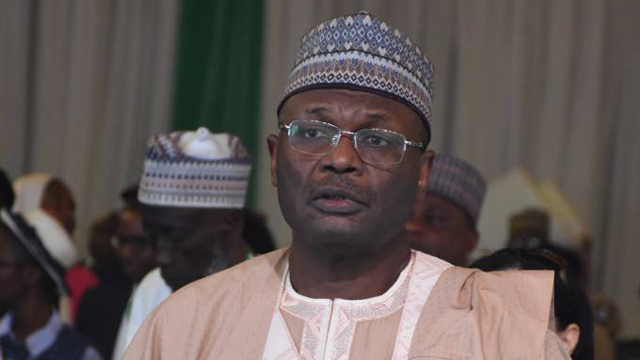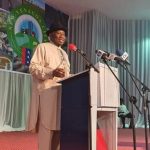
The Independent National Electoral Commission (INEC) has said political parties and candidates for the 2023 elections can only accept a maximum of N50 million in donations from individuals, groups or entities as support for their election bid.
The commission, however, said a political party or a candidate shall not accept any monetary or other contribution, which is in excess of N50, 000, and 000 except if it identifies and discloses the source of the contribution to the Commission.
This is contained in the guidelines for the conduct of political rallies, processions and campaigns as well as finances and election expenses of political parties, candidates and aspirants for the 2023 general election, released on Friday.
The document reads in part: “The maximum amount of money or other assets that an individual, a group of individuals or an entity can donate to a political party or aspirant for an election shall be N50 million.
“Contribution to candidates by an individual or entity shall be from 150 days allowed for campaigns to election day. Contribution to aspirants by an individual or entity shall be from the date notice of the election is published to the conclusion of party primaries.”
According to the document, election expenses of a political party mean all expenses in cash or otherwise incurred by a political party or candidates as well as party primary expenses of aspirants from the date notice of election is published to the day of election only.
“They exclude expenses incurred before the publication of notice of election. Election expenses of off-cycle or other elections shall relate to the period between the publication of notice for a particular election by the Commission and the date of the election. The election expenses of a candidate shall not exceed the limits prescribed in the Electoral Act, 2022.”
It explained that the election expenses of a political party shall be in three parts: the management of aspirants and party primaries, management of candidates and conduct of elections and miscellaneous election expenses.
The guidelines also stipulated that: “The election expenses of a political party for management of party primaries shall not exceed two-thirds (2/3) of the limits prescribed for candidates expenses in the Electoral Act, 2022 for respective elective positions.
“The election expenses of a political party for the conduct of elections shall not exceed two-thirds the limit of election expenses of each candidate multiplied by the number of candidates the political party shall sponsor in a particular election for elective
positions.”
The publication said, the miscellaneous election expenses of a political party shall include but not be limited to re-election cases against the party, post-election or election petitions and re-mobilisation of party members after elections.
On submission of annual statements of assets and liabilities of political parties, INEC said: “Every political party shall submit to the Commission, a detailed annual statement of its assets and liabilities and analysis of its sources of funds and other assets, together with a statement of its expenditure between January 1, and March 30 of the succeeding year in hard and soft copy.
INEC demanded that every political party shall notify it off and transfer to the commission any funds or other assets remitted or sent to a political party from outside Nigeria within 21 days of receipt, and where needed, the party shall provide such information as may be required by the electoral body.
For the submission of party election expenses report the guidelines requested that: “Every political party that participated in an election shall submit to the portal designated by the Commission an audited report of its election expenses within six months after an election.
“The reporting period shall commence 360 days to, and including, the Election day. The report shall be signed by the Auditors of the political party and counter-signed by the National Chairman of the political party supported by a sworn affidavit by the signatories as to the correctness of the content of the report.
“The report shall show the amount of money expended by or on behalf of the political party on election expenses, the items of the expenditure and the commercial value of goods and services received for the purposes of the election.
“Every political party shall publish the election expenses report it submitted to the commission in at least two national newspapers and on its website.”
With regards to the submission of election contribution report, INEC stated that: “Every political party sponsoring the election of a candidate shall submit to the portal designated by the Commission a report of the contributions made to it by individuals and entities within three months after the announcement of the results of an election. The report shall indicate the names, addresses, occupation of the donor(s) and the amount of money donated.”
INEC instructed that every party to ensure its candidates: “Maintain a detailed record of all contributions as well as any other source(s) of funds, and the record shall include names, addresses, and occupation of the donor(s) and amount donated.
“Maintain proper books of account and records of all expenses incurred during a political campaign. Do not accept or keep in his or her possession any money anonymously donated or other contributions, gifts or property from any source whatsoever.
“Disclose to the Commission, records of all contributions and other sources of funds for their campaign, as well as records of expenditure in a prescribed format as may be issued by the Commission. Submit detailed audited returns of their campaign expenses to the Commission within six months after an election.”
It said the audited returns of campaign expenses submitted by a political party shall; indicate details of donations, other sources of funding, expenditure on goods, services and sundry expenses incurred for the purpose of an election.
They are to be submitted to the Commission in a separate audited return within six months after an election; signed by auditors of the party and counter-signed by the chairman of, and supported by a sworn affidavit by the signatories as to the correctness of its contents.
The guidelines added that: “the Commission may remind Political Parties of their obligation to submit required reports to the Commission in accordance with the provision of Section 90(4) of the Electoral Act, 2022; and applicable sanction(s) for failure to comply as provided in Section 89(4) of the Electoral Act, 2022.”
In the guideline for the conduct of political rallies, processions and campaigns, INEC stated that the procedure to be followed demanded that:
“A political party shall, for purpose of political rally or procession, issue in writing a notice to the Commissioner of Police of the State or the Federal Capital Territory indicating the exact venue and time of the rally or procession and pledging peaceful conduct and control against violence or public nuisance.
“Political parties shall transmit to the Commission, through the Electoral Officer at the Local Government Area and the Resident Electoral Commissioner at the State, via a designated portal and also in hard copy, details of the schedule of their political rallies and processions at least 10 days to the date of the political rally or procession. The notice shall be jointly signed by the National Chairman and National Secretary of the Political Party.”
The guidelines said where there is conflict in the date, venue or time of the activities of different parties; their representatives shall meet in the presence of the Commission and the Nigeria Police to resolve the issues amicably.
They also stated that: “Where the Parties are unable to resolve the conflict amicably or between themselves, the Commission shall request the Political Party that submitted its notice later in time to reschedule its campaign, meeting, rally, procession, congress, convention or other activities for effective monitoring.”
On the conduct not permissible during political rallies, INEC insisted that: “No person attending a political rally or procession shall be in possession of any offensive weapon, except a police officer or a member of a security agency authorised to carry arms and is specifically posted to be present at that political rally or procession.
“No political rally or procession shall hold in places designated as religious centres, police stations and public institutions. Political rallies or processions shall not involve the use of abusive language or any form of hate speech. Political rallies or processions shall not involve the use of physical force or coercion by organised groups or individuals.”
It explained that a political campaign is canvassing for votes by Political Parties and Candidates by way of processions, rallies, electronic, social and traditional or print media advertisements, posters, handbills and house-to-house contact with voters, print and electronic or social media.
INEC said: “Political campaigns shall include, though not limited to, print and electronic media advertisement by public and private media organisations, internet advertising, house-to-house calls on voters, marches, gatherings, receptions, fundraising, courtesy calls, public displays of party flags, entertainment, posters, handbills or billboards in public places such as markets, schools, streets, highways.
“Air-display, audiovisuals, tinted vehicles, use of public address system in vehicles, fences of aspirants, candidates, supporters, party officials, private houses, as well as internet and social media networks.”
The guidelines provided that political parties shall submit to the Commission, in soft copy through a designated portal and in hard copy, notification of the schedule of their campaigns, stating the date, time, venue, agenda and list of members of the organising committee.
Parties are also demanded to submit police approval within the jurisdiction of the campaigns, within a minimum period not later than 10 days to the commencement of their campaigns.
INEC said campaigns by political parties and their candidates shall be based on their constitution and manifestoes, and shall comply with the provisions of; regulations and guidelines for political parties 2022 issued by the Commission; code of conduct, regulations and guidelines that may be issued by the National Broadcasting Commission; and COVID-19 safety protocols and other public health regulations and measures.
It stated that: “The target audience of the political campaign shall be registered voters. The programmes, policies and projects of political parties are offered to voters and achievements of the programme where applicable as contained in the political party’s Constitution and Manifesto.”
You may be interested

PSG To Reignite Interest In Osimhen
Webby - December 21, 2024Paris Saint-Germain have contacted Napoli to discuss signing Victor Osimhen in January, according to reports in France.It is reported that…

Arteta Provides Injury Updates On Five Arsenal Players Ahead Palace Clash
Webby - December 20, 2024Arsenal manager Mikel Arteta has revealed that Declan Rice and Riccardo Calafiori are both available to be in the Gunners…

Carabao Cup: Spurs Edge Man United In Seven-Goal Thriller To Reach Semi-finals
Webby - December 19, 2024Tottenham Hotspur edged Manchester United 4-3 in the quarter-finals of the Carabao Cup on Thursday.Spurs raced to a 3-0 lead…
















![American Pastor, David Wilson Seen Eating The Box Of Woman Who Isn’t His Wife [Video]](https://onlinenigeria.com/wp-content/uploads/2019/10/american-pastor-david-wilson-seen-eating-the-box-of-woman-who-isnt-his-wife-video-150x150.jpg)









